Resumir contenido con:
If you’re comparing Parloa to other voice & conversational AI platforms, you’re probably weighing speed to value, pricing clarity, and how voice-first the stack really is.
Parloa has momentum, backed by Microsoft’s ecosystem and fresh funding to scale, but different teams need different trade-offs. Many organizations have specific needs and unique requirements that drive them to seek custom solutions beyond what Parloa offers. That's where agile, truly voice-first platforms like Famulor AI come in.
In this article, I’ll break down the best Parloa alternatives, ranging from voice-first platforms like Famulor AI built for sub-second phone calls to broader enterprise suites, so you can pick what fits your goals, timeline, and budget.
What Is Parloa? (And Is It Right for You?)
Parloa is an AI Agent Management Platform for contact centers that orchestrates the full agent lifecycle (design, test, scale, and optimize) across voice and digital channels. The company positions itself as an enterprise-grade AI voice platform focused on automating customer service for large organizations.
The company also positions itself as “voice-first” and is deeply integrated with Microsoft Azure, Azure OpenAI, Azure AI services, AKS, and Cosmos DB, with listings in the Azure Marketplace.
This deep Microsoft integration is Parloa's core strategic advantage and its greatest filter. For an enterprise that is already a "Microsoft shop," Parloa offers seamless integration into their existing procurement, security, and technical ecosystems. For any organization that is not Azure-native—or one that prioritizes a cloud-agnostic, flexible stack—this dependency can be a significant liability, creating the very need for alternatives.
8 Pragmatic Reasons Teams Look Beyond Parloa
Even with solid enterprise capabilities, buyers commonly look at alternatives for a few pragmatic reasons that stem directly from its enterprise-first, top-down go-to-market model.
1. Opaque Pricing and Budget Uncertainty
Parloa doesn’t publish pricing on major listings. This is typical for enterprise software designed for high-touch sales cycles, but it can be a major roadblock. If you need clean cost modeling from day one to get a project approved, this lack of transparency can slow or halt approval cycles.
2. Partner-Led Implementation Delays
Parloa promotes a sizable certified partner ecosystem (Global System Integrators, advisory firms) to deploy and customize solutions. While this can be beneficial for complex, multi-year rollouts, it also means additional coordination, budget, and reliance on third-party services for changes you might want to execute in-house.
3. Lack of Self-Serve Agility
Much of Parloa’s content and positioning targets CIOs and large contact center transformations. Smaller teams, or even enterprise product teams, may prefer tools that optimize for rapid, self-serve iteration, allowing them to build, test, and launch without a lengthy procurement and implementation process.
4. Hidden Customization and Hosting Fees
Parloa’s own documentation notes that customer-specific adjustments may involve one-time development and additional hosting fees. These are critical factors to account for in the total cost of ownership (TCO) that are not visible upfront.
5. Low Signal from Public Reviews
As of today, there are very few public reviews on G2 for Parloa. This is a common side effect of a partner-led, top-down sales model. However, it gives buyers less external benchmarking and peer validation compared to more widely reviewed, product-led peers.
6. The Azure "Vendor Lock-In" Risk
The deep Microsoft partnership is a strength for Azure-native enterprises, but it's a significant consideration for others. Teams seeking cloud-agnostic flexibility or those running on AWS or GCP may prefer vendors that are built to be stack-agnostic from the ground up.
7. Complex Third-Party Integrations
Connecting Parloa with various third-party tools and marketing automation systems can introduce significant integration complexity. This often requires custom development work, further increasing costs and reliance on implementation partners.
8. Steep Initial Learning Curve
Deploying Parloa may involve a time-consuming initial setup and a steep learning curve. This often necessitates a dedicated technical team to manage the configuration and ongoing maintenance, in contrast to more intuitive, no-code, or API-first platforms.
If this high-touch, partner-led model doesn't map to your needs, it’s time to explore alternatives built for agility, transparency, and self-serve speed.
The Best Parloa Alternatives in 2025: Deep Dive
1. Famulor AI: The Voice-First Platform for Rapid Deployment
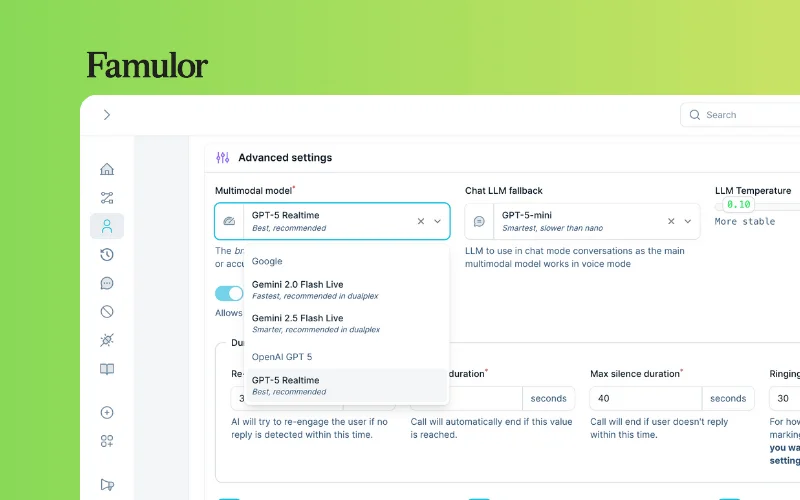
Famulor AI is one of the top alternatives to Parloa and is considered among the leading platforms for building AI voice agents. It is designed for teams that prioritize performance, transparency, and speed to value, addressing Parloa's primary drawbacks head-on.
Advantages Compared to Parloa
Famulor AI excels in areas like low-code infrastructure, rapid deployment, and easy integration, making it stand out for teams looking to quickly implement voice AI solutions.
Transparent pricing: (vs. Parloa's Opaque Pricing) Famulor AI uses a simple usage-based pricing model, so you always know what you’re paying for. There are no enterprise contracts, no hidden tiers, just clear and predictable costs per minute and per LLM.
Fast setup, no partner dependency: (vs. Parloa's Partner-Led Delays) You can build, test, and launch voice agents in hours, without needing certified integrators or long onboarding projects. This is perfect for teams spinning up AI receptionists or call automation pilots.
Voice-first architecture: (vs. Parloa's "Voice-First" Claims) Built from the ground up for real-time phone conversations, not adapted from chat. Famulor AI consistently delivers sub-second latency and smooth turn-taking that sounds genuinely human.
Bring-your-own-stack flexibility: (vs. Parloa's Azure Lock-In) Famulor AI offers seamless integration, connecting natively with telephony providers like Twilio, SIP trunks, or your own carrier, plus CRMs like Salesforce and HubSpot. It is cloud-agnostic.
Real-time analytics: Every call is automatically transcribed, summarized, and analyzed for sentiment and performance, giving teams immediate visibility to enhance customer satisfaction.
Full control over LLMs and voices: You can mix and match models (OpenAI, Anthropic, etc.) and high-quality voices (ElevenLabs, Openai, Gemini) to suit each use case.
Low maintenance, high scalability: Famulor AI’s lightweight infrastructure scales automatically across thousands of concurrent calls, with no complex provisioning or separate hosting layers.
Pricing
Famulor AI is among the cheapest options for enterprise-grade voice AI. Pay-as-you-go starts at €0.64-€0.15+ per minute, with volume discounts down to €0.11/min for Scale plans. You are charged only for connected calls, not for idle time. The base price covers core voice AI services, while the rest of the costs include telephony and advanced large language models.
Number rental is only €3.99 per month
OMR Review Rating
5/5 - This provides a strong "third-party review signal" that Parloa currently lacks.
Review
“Famulor AI has completely transformed the way we manage automated calls, with impressive voice quality and understanding”.
Recommended for:
Product teams and enterprises seeking a scalable, flexible voice AI platform that can be tailored to specific business needs, with transparent pricing, especially those focused on call center and outbound sales automation.
Build your first Famulor AI agent in minutes for free.
2. Synthflow: No-Code Visual Workflow Builder
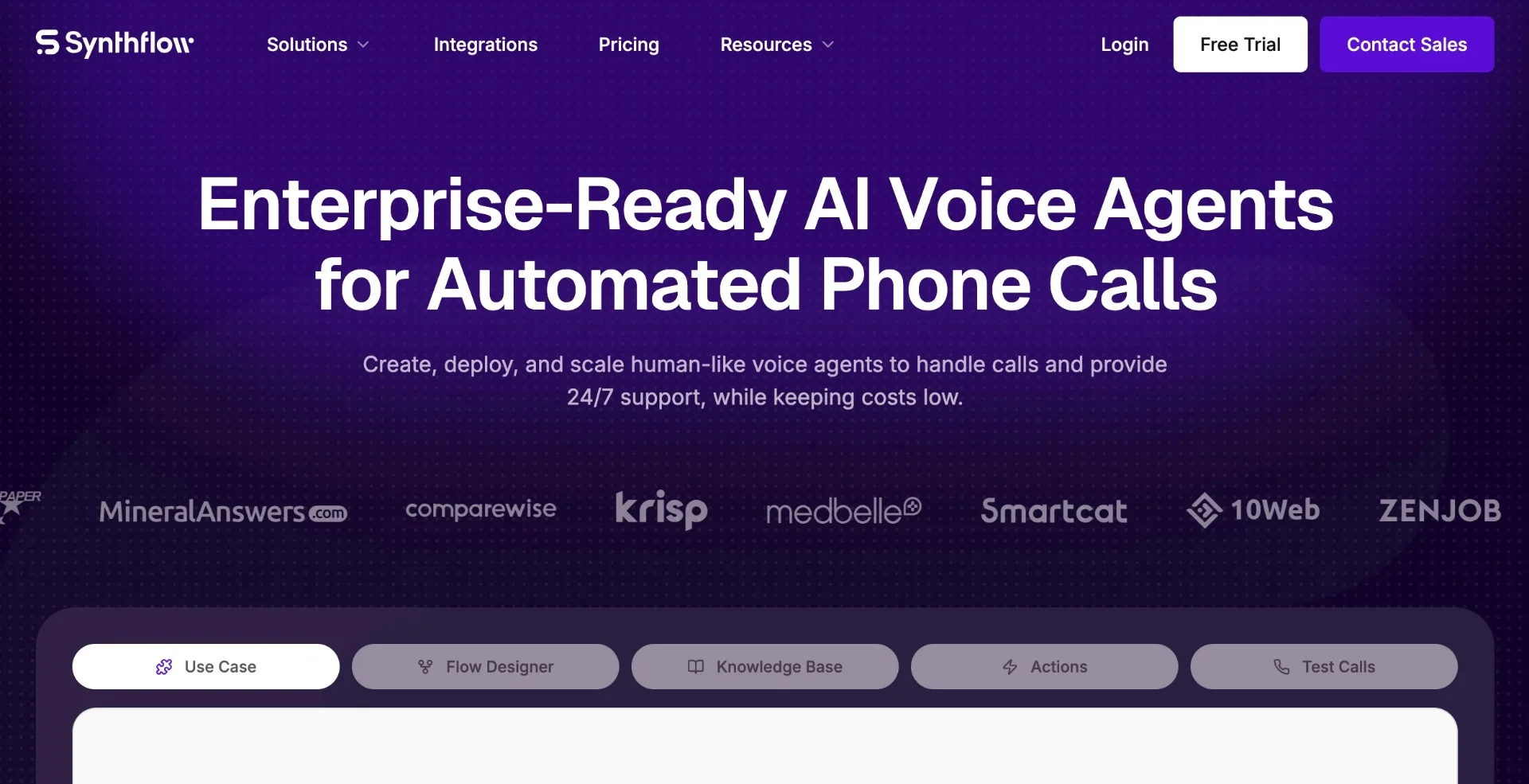
Synthflow is a scalable voice AI with a no-code visual workflow builder, real-time personalization, and deep CRM integrations. It supports HIPAA compliance, inbound routing, and multi-tenant management for agencies, making it a strong choice for production-grade voice automation without deep coding.
Advantages Compared to Parloa
Transparent pricing: Synthflow AI’s pay-as-you-go model (around $0.08 per minute) is clear and predictable, offering a simple alternative to Parloa's hidden enterprise quotes.
Faster deployment: With its no-code visual builder and pre-built templates, teams can go live in a matter of weeks, with no partner or technical onboarding required.
Lower latency and smoother calls: Synthflow AI delivers zero latency and sub-500 ms response times, creating natural conversations that feel more human and seamless.
Voice cloning and multilingual options: You can clone voices, adjust tone, and support 50+ languages, enabling natural conversations and brand personalization across markets.
Bring-your-own-carrier flexibility: Synthflow AI connects directly with Twilio, SIP trunks, phone systems, or your existing telephony stack.
Advanced features: Synthflow AI leverages generative AI capabilities for more dynamic and personalized interactions.
Pricing
The starter plan is one of the cheapest options for entry-level users, starting at $29/month for 5,000 minutes and 1 agent. The Growth plan at $99/month includes 20,000 minutes and unlimited agents. The scale plan at $249/month supports 60,000 minutes. Custom enterprise pricing is also available.
Review
“What I like best about Synthflow is that it doesn’t bury you in technical complexity. You don’t need to be a coder or spend weeks wiring together APIs just to get a usable AI voice agent”.
Recommended for
Marketing teams and enterprises with specific business needs in compliance and automation, as well as those requiring robust inbound support automation and deep integrations.
3. PolyAI
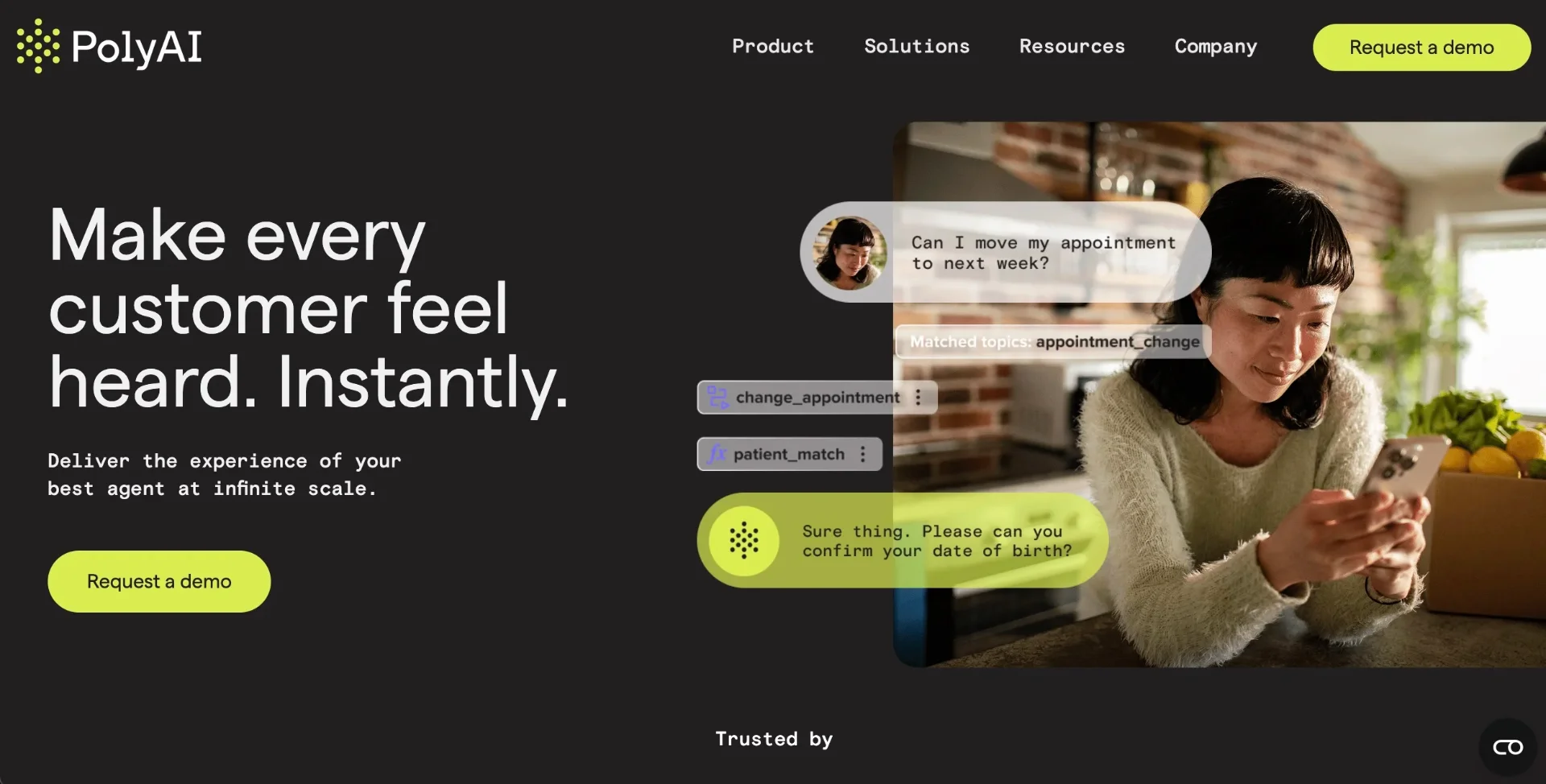
PolyAI specializes in multilingual customer support, call deflection, and advanced AI answering services for global audiences. It is a direct, enterprise-grade competitor to Parloa, focusing on high-volume contact centers.
It integrates with major CRMs and contact center systems and provides advanced voice customization, deep analytics, and rapid deployment.
Advantages Compared to Parloa
Pre-trained domain assistants: PolyAI comes with voice agents already trained for common tasks like authentication, billing, order management, reservations, and call routing, reducing custom training time.
High call containment from day one: In real deployments, PolyAI has achieved >80 % call containment (handling calls without human escalation) and up to 87 % success metrics early on.
Natural, “human-like” voice and language understanding: Their tech is tuned to let callers talk freely, interrupt, switch topics, and blend phrases while maintaining context.
Multilingual support & global readiness: PolyAI supports dozens of languages and accents, making it a stronger option for businesses with international customer bases.
Enterprise certifications & regulated industry readiness: PolyAI markets compliance certifications such as SOC 2, and integrates into regulated environments like healthcare and finance.
Pricing
Custom pricing with high entry thresholds (starting near $150K/year). Pricing is usage-based but not publicly disclosed, similar to Parloa's model.
Review
"There are many options for AI currently in the market. PolyAI impressed us by providing a product that could be launched in a short amount of time without risking quality".
Recommended for:
Large enterprises and contact centers needing fully managed, custom voice AI solutions with top-tier language capabilities, where budget is less of a concern than containment rates.
4. Bland
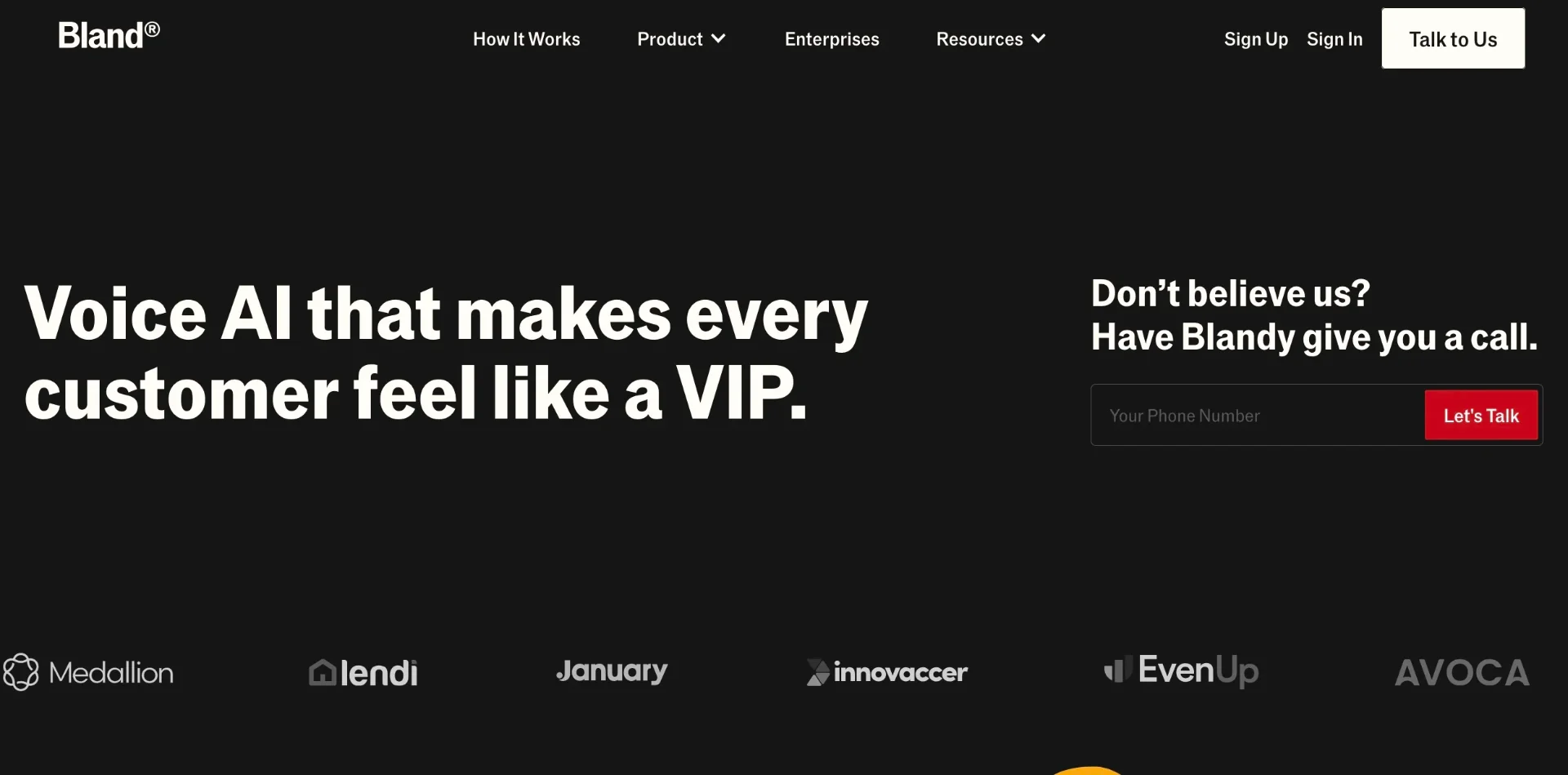
Bland emphasizes hyper-realistic voice experiences with strong security and data governance. It supports high-volume inbound and outbound calling, SMS, and omnichannel workflows, making it a great fit for enterprise-level AI telemarketing operations.
Bland markets itself as capable of scaling up to one million concurrent calls, making it attractive to enterprises that demand extreme resiliency.
Advantages Compared to Parloa
Massive scalability: Bland is built for high-volume operations, supporting up to one million concurrent calls, far beyond what most enterprise setups can typically handle.
Full conversational control: Its “Conversational Pathways” feature lets teams design precise dialogue logic, blending scripted and generative responses for tighter call control.
Own voice and model infrastructure: Bland trains and manages its own speech and reasoning models instead of relying on external providers, giving it deeper control over latency and reliability.
Multi-regional deployment and data control: Businesses can choose where their data is processed and stored, ensuring compliance with GDPR and local privacy regulations.
Built-in omnichannel support: Bland includes voice, SMS, and chat automation in one platform, offering smoother cross-channel continuity.
Pricing
No public pricing. Bland generally positions itself at the enterprise tier, with costs reflecting its scale and customization focus.
Best for:
Large enterprises with strict requirements for privacy, governance, and brand voice customization at a massive scale.
5. Ada.cx
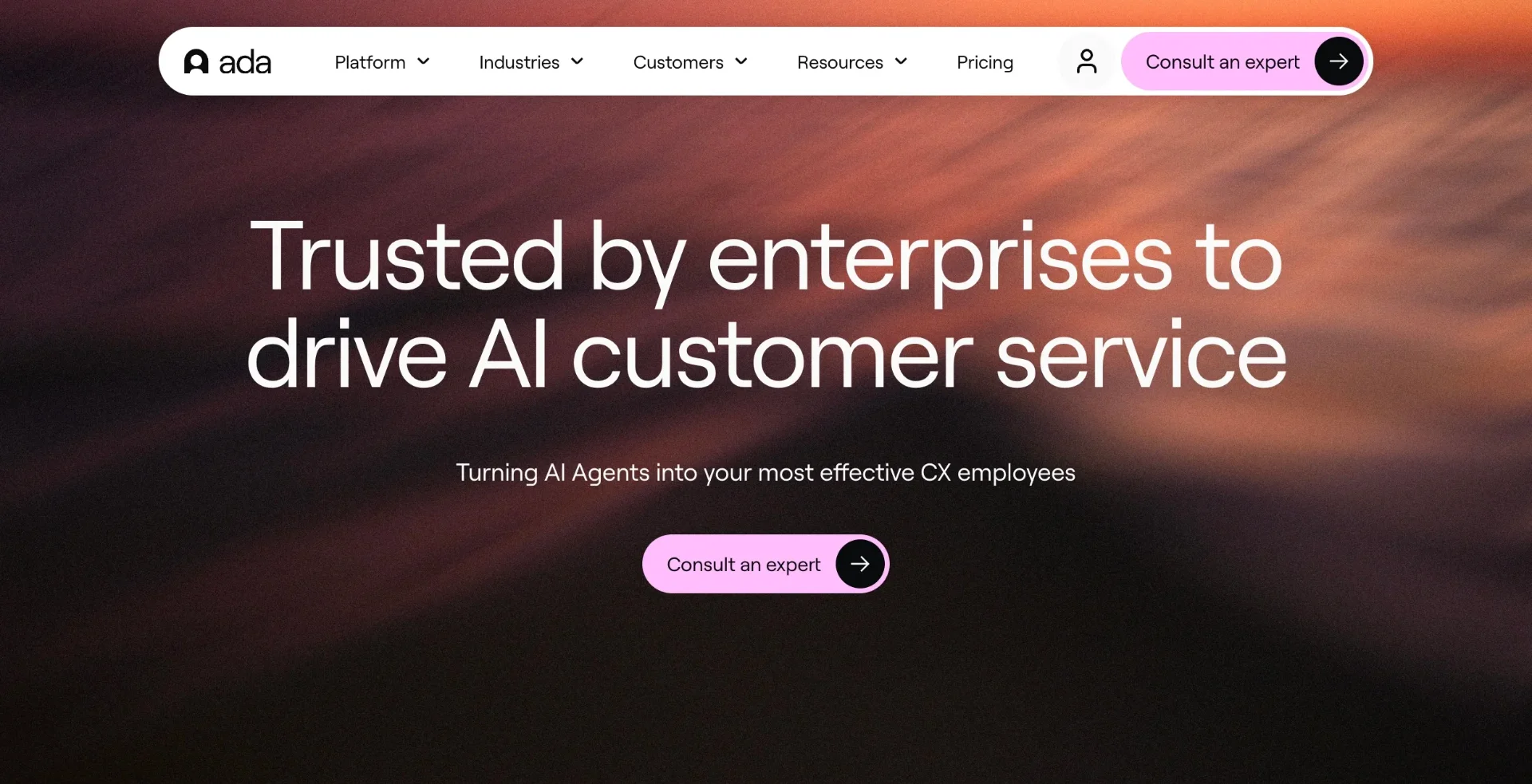
Ada.cx powers AI agents that automate customer service across chat, voice, and email, helping support teams handle complex requests at scale. Unlike traditional bots, Ada’s platform was built “AI-first,” meaning its agents can understand intent, trigger workflows, and escalate to humans while maintaining a consistent brand tone.
Advantages compared to Parloa
Omnichannel AI Agent: Ada supports all major channels under one “AI Agent” umbrella (voice, chat, email). This allows you to leverage advanced AI capabilities across every channel, not just stitch separate systems together.
Knowledge-driven generative responses: Ada can connect to your existing knowledge base and generate answers on the fly without rigid intent training, accelerating deployment.
Low latency, natural voice conversation: Ada’s voice agents handle freeform speech, interruptions, pauses, and open-ended queries, driving higher customer satisfaction.
Pay-for-resolution pricing model: Instead of paying per minute, Ada offers a model where you pay for resolved conversations, providing better alignment between cost and value.
Enterprise-grade compliance & scale: Ada supports HIPAA, SOC 2, and GDPR and is built to handle high-volume traffic.
Review
“Ada helped our small support team contain the most easy-to-resolve customer inquiries, freeing-up more time for agents to go through our backlog.”
Pricing
Ada uses a performance-based pricing model, where companies pay based on successful resolutions or interaction volume. Exact pricing is custom, but most enterprise plans start in the low six figures annually.
Recommended for:
Brands that prioritize customer experience at scale, especially e-commerce, fintech, and telecom companies, where omnichannel support is as important as voice.
6. Sierra AI
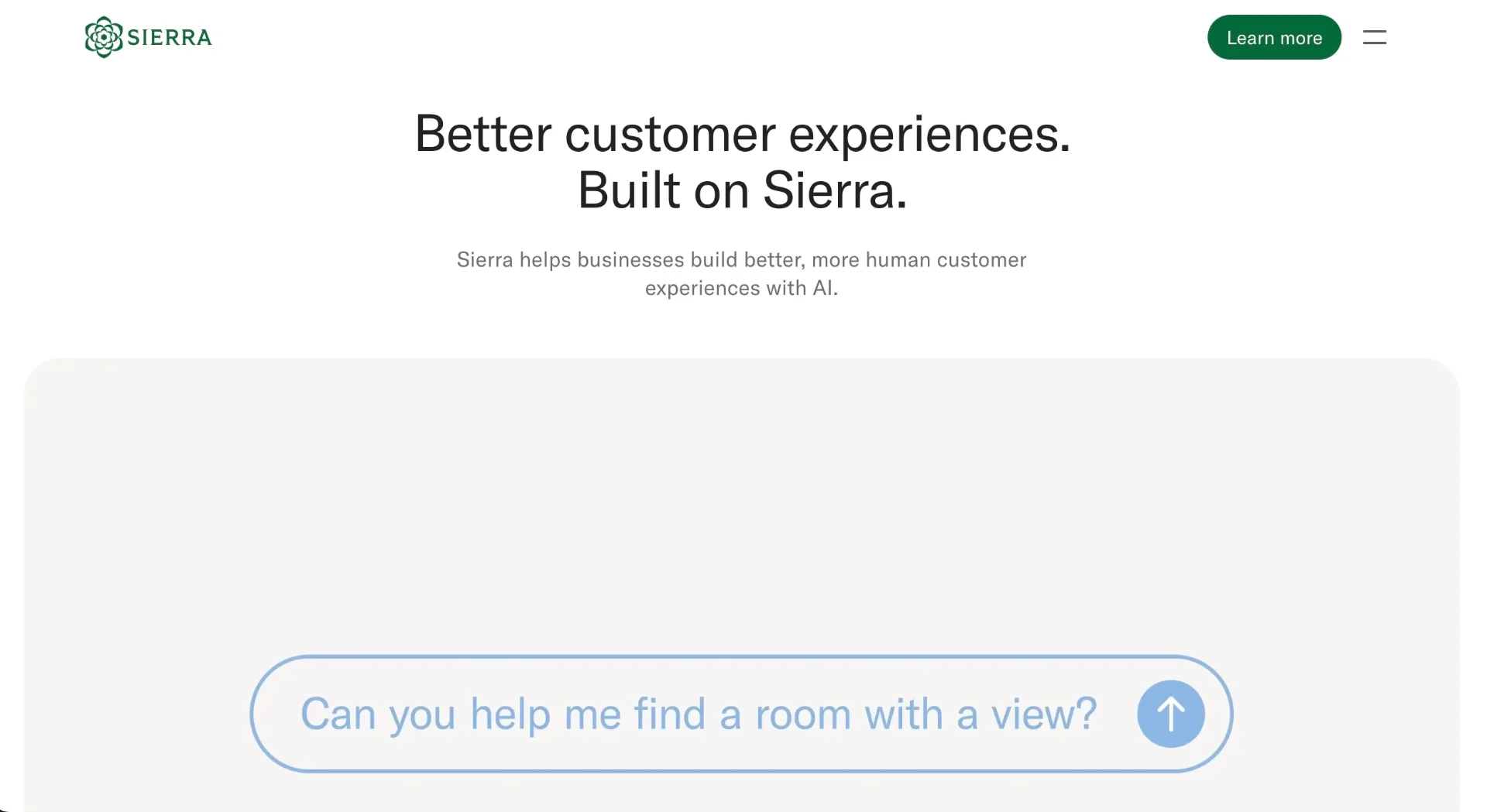
Sierra AI deploys advanced AI agents for customer service that are uniquely trained to align with a company's specific brand identity. These agents can reason, predict, and take action not just based on a knowledge base, but also by adhering to the company’s tone, values, and policies for a highly personalized interaction.
Advantages compared to Parloa
Agents that take action: Sierra agents integrate with backend systems (CRM, order management) to execute tasks (like processing returns) rather than just chat.
Multi-model / model redundancy architecture: Sierra uses a “constellation” of models (OpenAI, Anthropic, Meta, etc.) to improve reliability and reduce hallucinations.
Voice + omnichannel support: Sierra added conversational voice capabilities to its AI agents, enabling natural phone calls with tone, interruptions, and human-like cadence.
Strong guardrails, auditing & data governance: Sierra emphasizes that agents obey policy and include full auditing, so you can trace and manage decisions.
Brand-level customization & tone alignment: You can tune your AI agent’s tone, vocabulary, and brand-specific language so the agent “feels like you.”
Review
“User friendly, fast and many supported languages. Very complex setup process and more bugs then competitors”.
Pricing
Sierra’s pricing begins at approximately $150,000 annually. Final pricing is customized based on agent complexity and expected interaction volume.
Recommended for:
Customer-centric brands where a consistent voice and adherence to company policy are critical, especially in telecommunications and financial services.
7. Cognigy
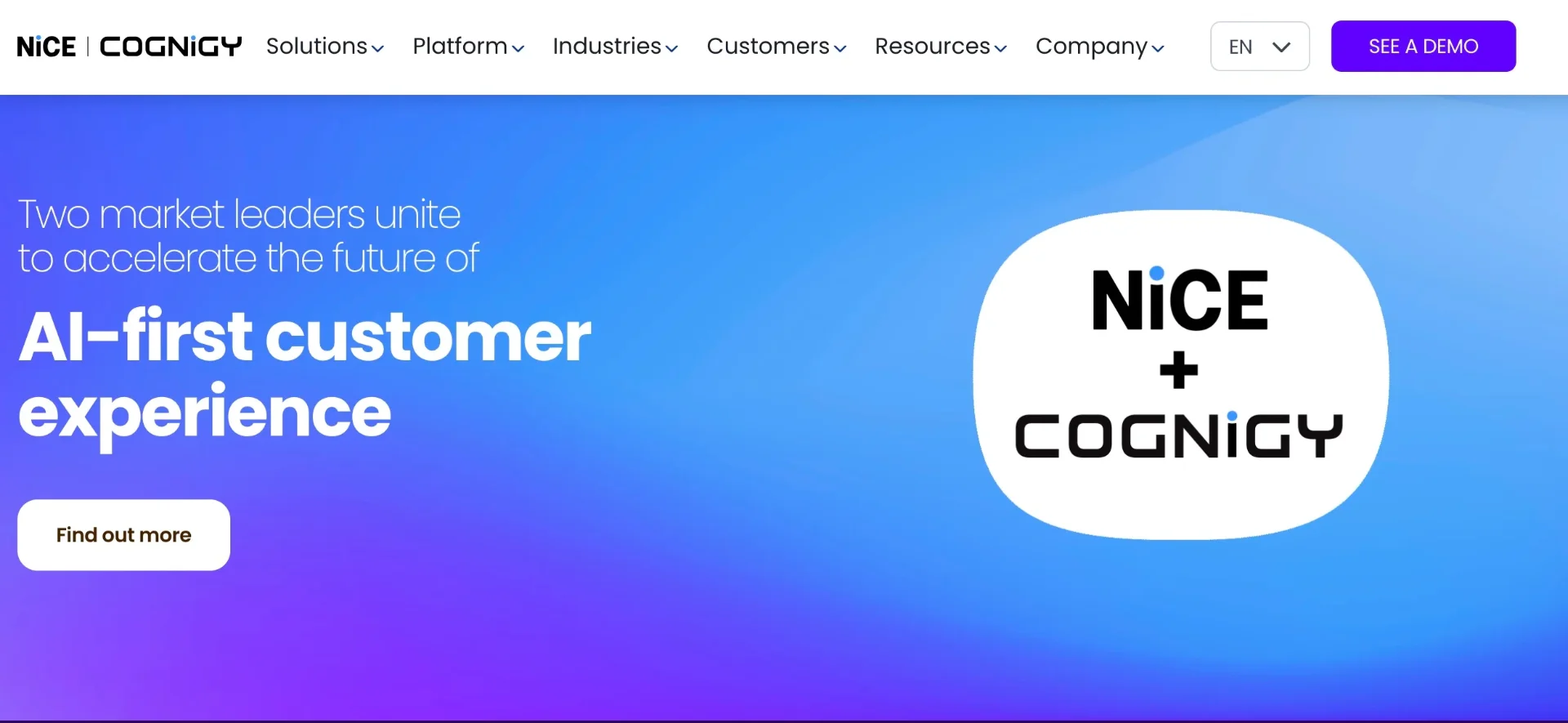
Cognigy is a conversational automation platform built for complex, enterprise-grade deployments. It supports voice and chat channels, advanced orchestration, multilingual interactions, and customizable workflows, making it a flexible option for multinational organizations.
Advantages Compared to Parloa
Omnichannel & multichannel strength: Cognigy is built to support seamless voice, chat, messaging, and web channels in one agent architecture.
Deployment flexibility: Cognigy offers more hosting options, including on-prem or private clouds. This is a critical differentiator for enterprises with strict data residency or compliance needs that cannot use a public cloud like Azure.
Visual flow builder + hybrid logic: As a low-code platform, Cognigy provides graphical flow design and the ability to mix rule logic and generative logic for easier customization.
Strong integration & connector ecosystem: Cognigy features many prebuilt extensions and connectors to CRMs, telephony, backend systems, and knowledge bases.
Process automation + backend action capability: Cognigy agents can take actions, update systems, and trigger workflows, not just respond.
Pricing
Enterprise licensing, typically customized to deployment scale and channel usage. Pricing is not publicly listed.
Review
"Overall I loved it but I must mention that it does not support an extensive workflow".
Recommended For:
Global enterprises with complex workflows, multiple channels, and a need for deep orchestration or on-premise deployment.
8. Decagon AI
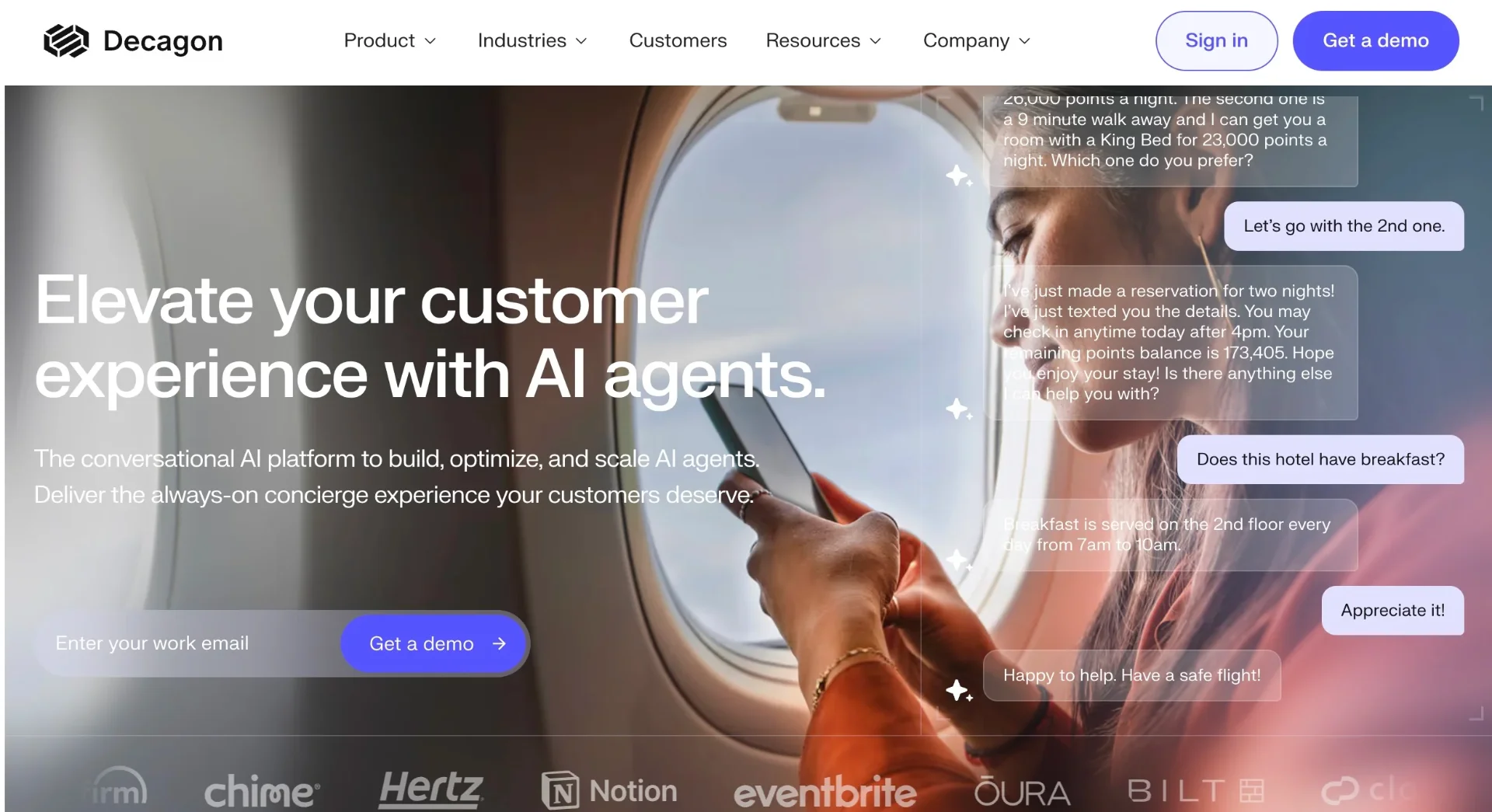
Decagon.ai offers a unified AI engine that auto-resolves customer issues across chat, voice, email, SMS, and custom channels in any language. Their approach centers on Agent Operating Procedures (AOPs): natural-language instructions that compile into logic, allowing teams to tweak behavior without heavy coding.
Advantages Compared to Parloa
Natural-language “Agent Operating Procedures” (AOPs): Decagon lets you define business logic in plain language, meaning non-technical teams can iterate quickly.
Unified omnichannel + voice capability: Decagon supports chat, email, SMS, and voice, so you don’t need separate stacks for different channels.
Custom voice + brand tuning: Decagon integrates with ElevenLabs to bring human-like voice agents, with control over tone and pronunciation.
Deep action capabilities & system integrations: Decagon can call APIs, connect with Stripe (for refunds, billing), and trigger other backend workflows.
Full observability & decision traceability: Every decision and path is traceable, with built-in audit, transparency, and versioning.
Pricing
Decagon offers two main tiers: per-conversation pricing (a flat fee per interaction) or per-resolution pricing (you only pay when the AI fully resolves a query). Pricing is custom and aimed at enterprise clients, with estimated ranges spanning $95,000 to $590,900+ per year.
Review
"The biggest upside of using Decagon isn't simply the assumption of repetitive day-to-day tasks... but that Decagon allows us to evaluate data on a much deeper level."
Recommended for:
Organizations that demand high customization, transparency, and outcome-driven automation, especially in sectors like fintech, telecom, or SaaS.
9. Voiceflow
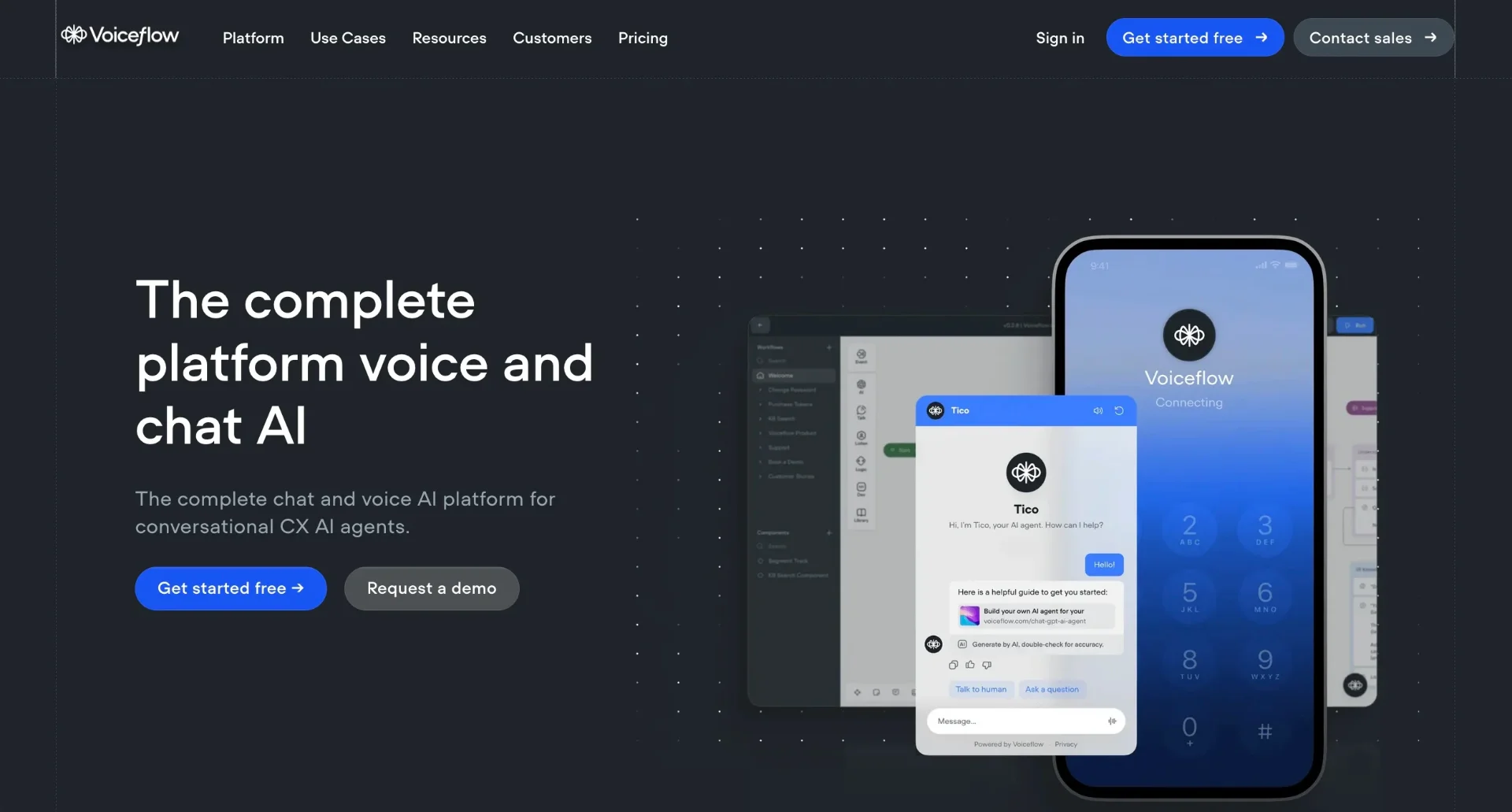
Voiceflow is a leading no-code platform for designing conversational workflows across both voice and chat. It excels in prototyping and collaboration, allowing teams to co-design flows, manage knowledge bases, and test experiences before launch.
Advantages Compared to Parloa
Ultra-fast prototyping & iteration: Voiceflow’s drag-and-drop flow builder lets teams spin up new agents or features in hours, far quicker than Parloa’s enterprise onboarding.
Collaborative by design: Voiceflow supports real-time collaboration, versioning, shared workspaces, and commenting, so designers, developers, and stakeholders can work together.
Tech stack agnostic / avoid vendor lock-in: You can integrate any LLM, API, backend, or data source. Voiceflow doesn’t lock you into one model or provider.
Voice + chat (multi-modal) support: You can build agents that handle both voice and text conversations from the same interface.
Enterprise security & compliance features: Despite being design-forward, Voiceflow offers SOC 2 / ISO27001 compliance and secure guardrails.
Pricing
Voiceflow offers a free plan for basic usage. The Pro plan starts at $60 per editor/month, while the Business plan at $150 per editor/month supports unlimited agents. Enterprise pricing is available on request.
Review
"Good platform if you have less than 5,000 chats per month, otherwise extremely expensive".
Best for:
Startups, design teams, and innovators building prototypes or multichannel bots where iteration speed and collaboration are more important than massive call concurrency.
10. Replicant
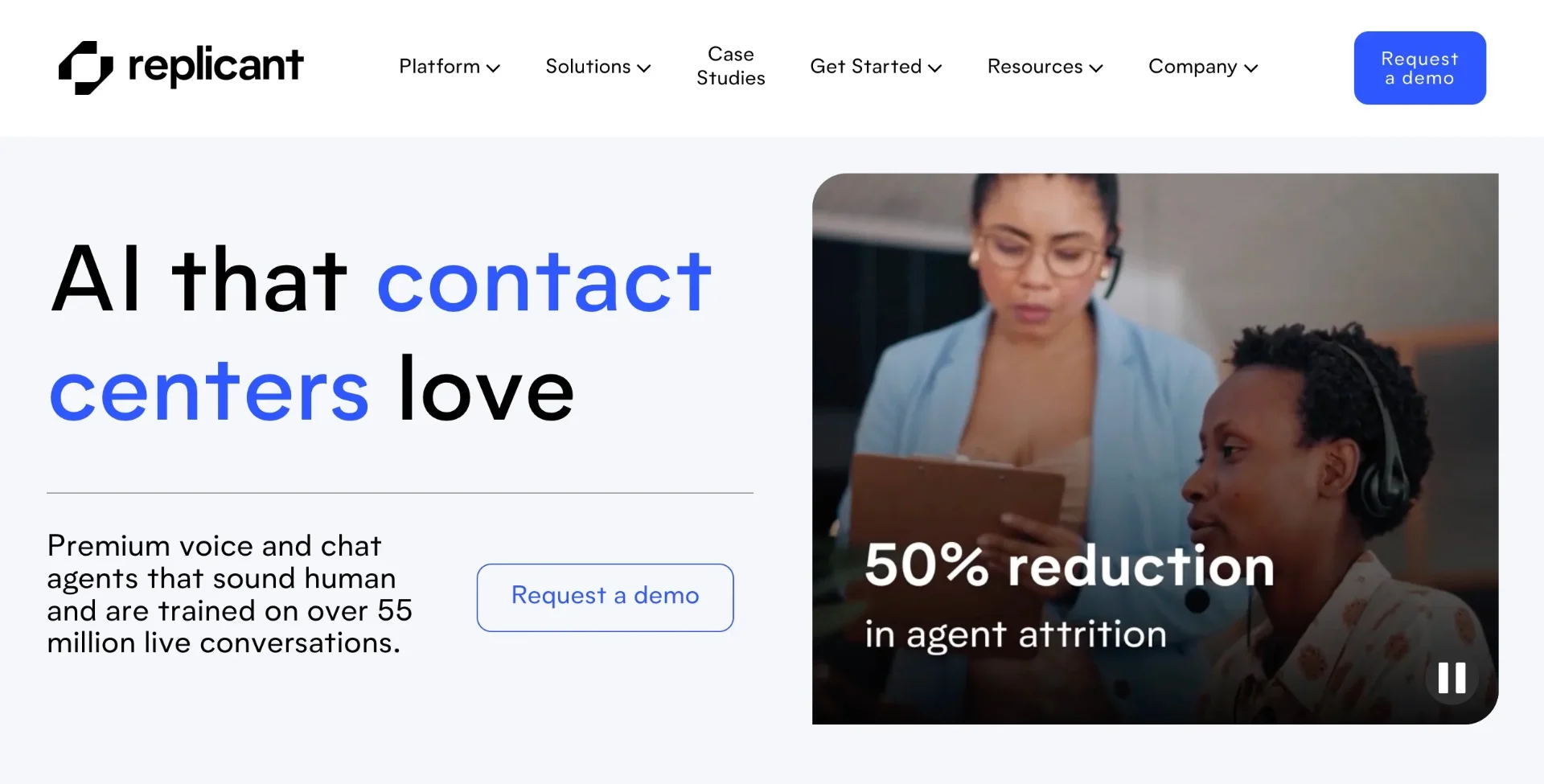
Replicant is an enterprise-grade automation platform for contact centers. Its “Thinking Machine” resolves Tier-1 customer calls autonomously, escalates to live agents when needed, and integrates with backend systems to complete workflows. The platform includes analytics and conversation intelligence tools for optimizing performance.
Advantages Compared to Parloa
High automation / resolution-first approach: Replicant is built to resolve customer issues end-to-end rather than just deflect or route them, reducing reliance on live agents.
Omnichannel + voice support: Replicant handles voice, chat, and SMS conversational automation across channels.
Strong implementation support: Users often cite Replicant’s responsive customer support and partnership during deployment as a differentiator.
Proven enterprise scale: Replicant’s “Thinking Machine” has been deployed in real contact centers, scaling with volume and complexity.
Insights and analytics baked in: Replicant provides real-time analytics and intelligence to help you continuously optimize performance.
Pricing
Replicant does not publish pricing publicly. Engagements are structured as enterprise contracts, tailored to call volumes and complexity.
Review
"The team is quick to reply if there are any technical concerns and is open to feedback. They usually respond within an hour when a ticket is sent in".
Recommended For:
Large-scale contact centers that want to automate high call volumes end-to-end, with the support of an established vendor in the voice automation space.
11. ElevenLabs
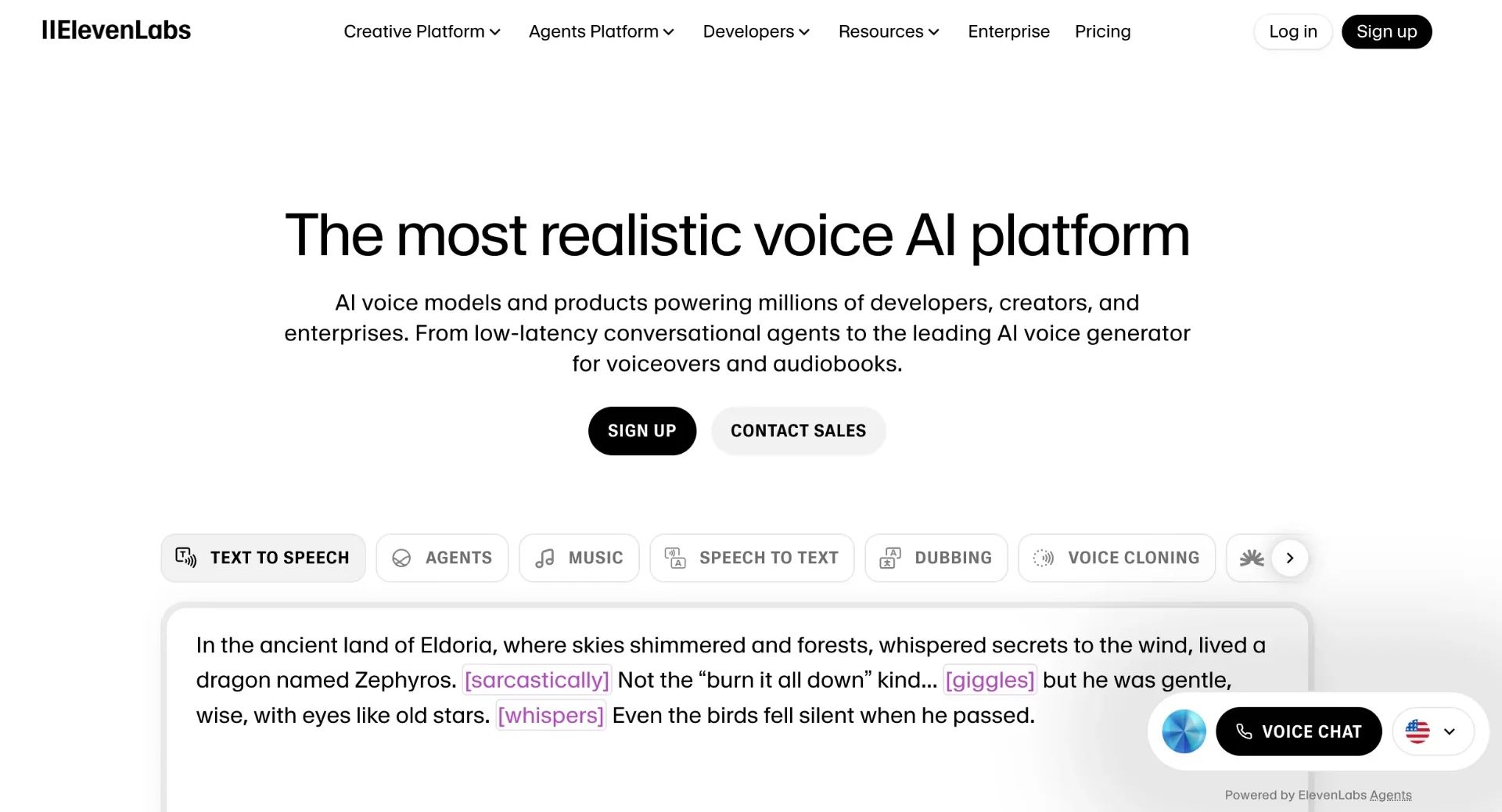
ElevenLabs is best known for its world-class text-to-speech and voice cloning technology, and it has recently expanded into conversational AI agents. Their platform can take user input (voice or text), ground it in your data, and produce natural spoken replies.
It is less of a full-blown telephony agent system and more of a powerful component for creating branded, high-quality voice interactions.
Advantages compared to Parloa
Ultra-realistic voice synthesis & emotional nuance: ElevenLabs produces very human-sounding voices, capturing tone, pitch, and pauses to make speech feel natural.
Advanced voice cloning with minimal data: It allows cloning or customizing a voice from a few short audio samples, giving brands a unique vocal identity.
Multilingual & cross-language support: ElevenLabs supports dozens of languages and can dub or translate while preserving the original voice’s tone.
Flexible and brandable voice design: Users can adjust voice age, accent, gender, and style to match brand tone.
Pricing
ElevenLabs uses a usage-based credit system.
Free: 10,000 credits / month (≈10 minutes of high-quality TTS)
Starter: $5/month for 30,000 credits
Creator / Pro / Business / Enterprise: Tiers scaling up to millions of credits with higher-quality audio, API priority, and SLAs.
Recommended for:
Brands with a strong audio focus (podcasts, narration, gaming) that want to layer in conversational agents. It is exceptionally strong when sound quality and voice branding are the #1 priority over complex telephony orchestration.
Final Verdict: How to Choose Your Parloa Alternative
The conversational AI space is evolving fast, and every Parloa alternative brings a unique strength to the table. Synthflow shines for teams that want quick, no-code deployment. PolyAI leads in natural-sounding voice experiences and multilingual performance. Cognigy and Sierra deliver powerful enterprise workflows with deep backend integration. Ada.cx focuses on omnichannel coverage, while Bland pushes the limits of scalability.
Calcula tu ROI automatizando llamadas
Descubre cuánto podrías ahorrar al usar voice agents con IA.
Resultado ROI
ROI 228%
Sin tarjeta de crédito
If you are a large enterprise needing a direct, like-for-like Parloa swap with on-prem capabilities, Cognigy is a strong fit. If you prioritize a unified agent for chat, email, and voice, Ada.cx is a leader.
That said, most of these platforms come with trade-offs, from opaque pricing to limited flexibility or slower setup cycles—the very reasons you're likely looking for a Parloa alternative in the first place.
Famulor AI stands out by balancing what really matters: sub-second voice latency, a transparent pay-as-you-go model, and a voice-first architecture purpose-built for live, human-like conversations.
If your goal is to deploy real-time, reliable voice agents that scale with your business, or to enhance your AI customer support workflows without the friction or guesswork, Famulor AI is the clear choice.
Build your first Famulor AI agent in minutes for free.
Artículos relacionados

AI Phone Assistant Comparison 2026: Providers, Pricing & Trends

The Era of Seamless Communication: Why Omnichannel is Essential for AI Agents














